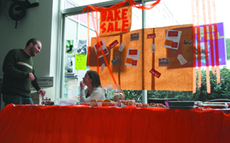To many people, slavery in America holds a dark place in history that ended more than a century ago; however, recent prostitution rings involving trafficked women from Thailand, Korea, Vietnam and Cambodia in cities across the U.S. prove slavery remains and may be gaining ground in post-Katrina New Orleans.
Social justice scholars – recipients of the Social Justice Scholarship who routinely perform service projects – are on a mission to spread awareness about human trafficking in New Orleans and to help law enforcement agencies identify and prosecute the criminals running these operations.
“Women of all ages from the Far East, in countries like Vietnam and Cambodia (are involved),” said Colleen Sheehan, a sociology sophomore involved with the project.
“Some of them are robbed and kidnapped, some are sold by their families and some think they’re coming here for a job to be a waitress and they don’t realize what’s really going on.”
“These people lock them in houses and force them to have sex,” Sheehan said.
A group of social justice scholars spent the past week driving around in pairs in several areas of New Orleans, including the French Quarter and Central Business District, searching for suspicious-looking businesses and taking down their names and addresses.
Assistant sociology professor Sue Mennino divided the city into sections with the help of the Metropolitan Center for Women and Children to identify target locations, such as areas surrounding convention centers, which have been reported as hotbeds of businesses exploiting trafficked women.
The next step will involve running the names of the suspicious businesses through the city’s database to see if they’re operating with valid licenses.
Mennino explained that she will turn over those businesses without licenses to the New Orleans Police Department, as well as Councilwoman Stacy Head, who represents the section of the city under investigation.
“Last year in other cities they busted a lot of these places like spas, holistic health centers, massage parlors,” Mennino said.
“(Students) have instructions not to interfere, not to enter for safety reasons because if the operators think we’re on to them, they’ll move and change their name and that will negate everything we’re doing.”
The group started raising awareness with a bake sale held last week, and will host the Human Trafficking Awareness Fair in April.
Students like Antoinette Spillers, political science junior, aren’t surprised to learn human trafficking exists in New Orleans. She also said it’s good to inform people about it.
“It’s a good way to attack the numerous social issues we’re dealing with, especially post-Katrina. Most of the social issues we had before the storm have doubled, even tripled,” Spillers said.
“So I’m glad somebody is speaking out about this and putting this in the public eye and hopefully, there can be more political actions taken by those in power.”
Jordan Hultine can be reached at [email protected].







